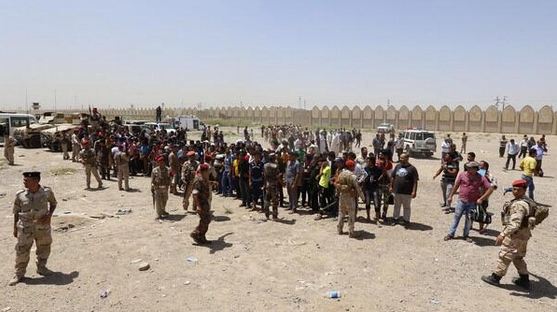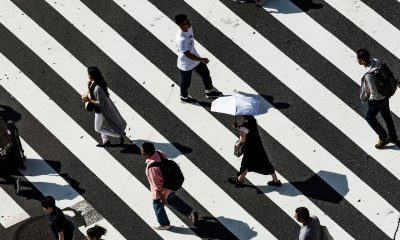Headline
Thousands of Iraqi men answer urgent call to arms

Men answer Iraq’s call to arms. Photo courtesy of Joaquim Casanovas / Twitter
BAGHDAD — Thousands of Shiites from Baghdad and across southern Iraq answered an urgent call to arms Saturday, joining security forces to fight the Islamic militants who have captured large swaths of territory north of the capital and now imperil a city with a much-revered religious shrine.
The mobilization, urged by the nation’s top Shiite cleric, took on a sectarian dimension that threatened to intensify Sunni-Shiite strife in a nation already ripped by religious fervor after the militants’ battlefield successes.
In Baghdad, fallout from the stunning advance in the north was beginning to affect daily life for the city’s 7 million inhabitants.
Some food prices rose dramatically. Army troops went house-to-house searching for militants and weapons in neighborhoods close to vital government installations. The streets of the capital were quieter than usual, and military and police checkpoints made extra efforts to check cars and passenger IDs.
The price hikes were partly the result of transportation disruptions on the main road linking the capital with provinces to the north, but they might also be a telltale sign of a nervous city.
“We were not prepared for this sudden spike in the prices of foodstuff, vegetables and fuel,” said Yasser Abbas, a government employee from Baghdad’s sprawling eastern Sadr City district.
“I do not know how the poor people in Baghdad will manage their life in the coming days. God be with them until this crisis is over because hunger is as dangerous as bullets.”
In the meantime, dozens of men climbed into the back of army trucks at volunteer centers, chanting Shiite religious slogans, hoisting assault rifles and pledging to join the nation’s beleaguered security forces to battle the Sunni militants of the Islamic State of Iraq and the Levant, or ISIL.
“By God’s will, we will be victorious.” said one volunteer, Ali Saleh Aziz. “We will not be stopped by the ISIL or any other terrorists.”
The volunteers were first taken to an assembly center in eastern Baghdad, where they were handed military uniforms, and later went to Taji, home of Iraq’s largest military base north of Baghdad, to undergo basic training. State-run television aired footage of the volunteers being drilled, still in their civilian clothes.
The mobilization unfolded against a backdrop of religious and nationalist fervor. State-run television aired a constant flow of nationalist songs, clips of soldiers marching or singing, as well as interviews with troops vowing to crush the militants. Other broadcasts included archival clips of the nation’s top Shiite clerics and aerial shots of Shiite shrines.
Shiite cleric and political leader Ammar al-Hakim was shown on television networks donning camouflaged military fatigues as he spoke to volunteers from his party, although he still wore his clerical black turban that designates him as a direct descendant of the Prophet Muhammad.
Prime Minister Nouri al-Maliki, a Shiite widely resented by Sunnis for his perceived sectarian policies, denied the call by the Iranian-born Grand Ayatollah Ali al-Sistani was directed against Sunnis, saying it was in fact meant to protect the country and its holy shrines.
“Talk of Sunnis and Shiites must be dropped,” he said, calling for the unity of all Iraqis.
Many volunteers, however, said they had enlisted to protect their faith and shrines at risk in the city of Samarra north of Baghdad and elsewhere. The militants have threatened to march all the way south to the holy cities of Najaf and Karbala, home to two of the most revered Shiite shrines.
Al-Maliki himself appeared to give the standoff with ISIL a sectarian color, paying a surprise visit to Samarra on Friday and appearing on state-run television while praying there. The shrine was badly damaged in a bombing blamed on Sunni extremists in 2006. That attack sparked a wave of bloodletting between Sunnis and Shiites that lasted two years. The bloodshed ebbed in 2008 after the U.S. troop surge, a revolt by moderate Sunnis against al-Qaida in Iraq and a Shiite militia cease-fire.
The footage seemed clearly aimed at rehabilitating his reputation in the eyes of Shiites as a protector of the faith and its followers. He also declared that Samarra would be the assembly point for the march north to drive out the militants, another apparent religious incentive to Shiites.
On Saturday evening, a dozen armed militiamen got off a bus on a main central Baghdad road and chanted Shiite slogans before driving away.
Fighters from the al-Qaida splinter group, drawing support from former Saddam Hussein-era figures and other disaffected Sunnis, have made dramatic gains in the Sunni heartland north of Baghdad after overrunning Iraq’s second-largest city of Mosul on Tuesday. Soldiers and policemen have melted away in the face of the lightning advance, and thousands have fled to the self-ruling Kurdish region in northern Iraq.
On Saturday, insurgents seized the small town of Adeim in Diyala province after Iraqi security forces pulled out, said the head of the municipal council, Mohammed Dhifan. Adeim is about 100 kilometers (60 miles) north of Baghdad. There was no official confirmation of the loss of the town.
Jawad al-Bolani, a lawmaker and former Cabinet minister close to Prime Minister Nouri al-Maliki, said a military offensive was underway Saturday to drive the insurgents from Tikrit, Saddam’s hometown north of Baghdad, although fighting in the area could not be confirmed.
Major-General Qassim al-Moussawi, spokesman for the Iraqi military’s commander in chief, said Iraq’s armed forces have “regained the initiative” in the north and northeast, blunting ISIL advances and regaining control of some localities.
As President Barack Obama considers possible military options for Iraq, Defense Secretary Chuck Hagel ordered the aircraft carrier USS George H.W. Bush to move from the northern Arabian Sea into the Persian Gulf. The carrier was to be accompanied by two guided-missile ships.
Iranian President Hassan Rouhani said Saturday that his Shiite nation stands ready to help Iraq if asked, adding that it has “no option but to confront terrorism.”
He said Iran would “study if there is a demand for help from Iraq” but that no specific request for assistance had been made.
Entry of Iranian forces into Iraq “has not been raised so far,” and “it’s unlikely that such conditions will emerge,” he added.
Iran has built close political and economic ties with Iraq since the 2003 U.S.-led invasion toppled Saddam’s Sunni-led regime.
Associated Press writer Qassim Abdul-Zahra contributed to this report.





















